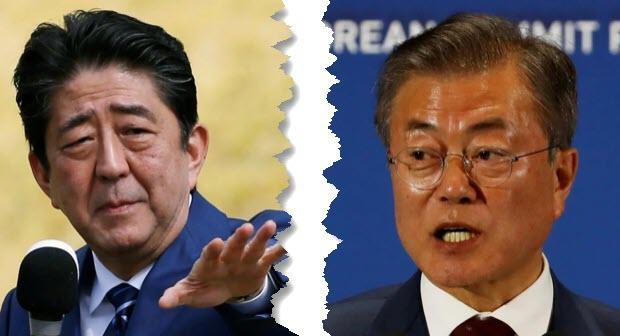Most Americans could be forgiven for thinking that the ‘trade war’ is really only impacting the US and (maybe) China. After all, it was President Trump’s belligerent rhetoric about holding China accountable that helped him win in 2016 in the first place. But what is less known, is that Trump’s angry trade rhetoric aggravated a bunch of other longstanding trade spats, most notably, the now-emergent trade spat between Japan and South Korea, which is threatening to seriously disrupt trade throughout the Pacific Rim region.
Now, according to the Nikkei Asian Review, in the latest sign of how the relationship between the two countries has deteriorated, South Korea has decided not to extend an intelligence-sharing agreement with Japan.
The decision was reportedly made at a National Security Council meeting on Thursday at South Korea’s “Blue House.” South Korea said it no longer believes the agreement is “in its national interest” after Japan excluded South Korea from the “so-called” “White Countries’ list”.
Kim Yu-keun, the National Security Office’s deputy director, said: “We thought that it is not in our national interest to maintain the agreement,” adding that, “We will inform the Japanese government through diplomatic channels by the deadline of the extension, according to the agreement.”
Kim said: “The government estimated that the Japanese government caused a critical change in the circumstances of security cooperation between the two countries by excluding our country from the so-called white countries’ list…with no clear evidence, on Aug. 2.”
For the record, that ‘white countries’ list? It’s not what it sounds like.
The timing of the pact’s termination is also interesting because of North Korea resuming its short-range missile tests, as well as its threats to call off peace talks with the South and the US.
Yoshihide Suga, Japan’s chief cabinet secretary, late last month said that Tokyo wanted to maintain the pact, known as the General Security of Military Information Agreement.
The neighbors signed the agreement in 2016 out of a desire to cooperate in the face of an increasing threat from North Korea. The agreement stipulates how the countries can share military intelligence.
SK’s decision not to extend the pact follows a meeting between the two countries foreign ministers in Beijing, where South Korean Foreign Minister Kang Kyung-wha demanded that Japan rescind its decision.
The decision came one day after South Korean Foreign Minister Kang Kyung-wha met with her Japanese counterpart, Taro Kono, in Beijing. South Korea’s foreign ministry said Kang had expressed regret in regard to Japanese Prime Minister Shinzo Abe’s decision to exclude South Korea from its “whitelist” of trusted trading partners earlier this month. She urged Tokyo to withdraw the decision that makes it more cumbersome for South Korean companies to import certain materials from Japan.
Unsurprisingly (since NAR is a Tokyo-based business newspaper), most of the analysts quoted in the piece seem to think South Korea’s decision is a bad idea.
Analysts say Seoul should be careful about escalating the feud to include the intelligence agreement, which benefits both countries.
“We had better keep the agreement,” Lee Su-hoon, a professor at Kyungnam University and a former ambassador to Japan, said at a forum. “We need military information. However, sharing high-class information should be based on trust.”
Leif-Eric Easley, a professor at Ewha University in Seoul said in the report: “The Moon government may see this decision as domestically popular and as a symbolic, low-cost way of signaling resolve to Tokyo. However, this move will raise international concerns that Seoul misreads the regional security situation and is presently unwilling to shoulder its responsibility for improving Korea-Japan relations.”
The relationship between the two countries has been deteriorating since even before a South Korean court ruled that Japanese companies must pay reparations to Koreans forced to work in Japan during WWII, which Japan has claimed goes against a treaty signed in 1965, that supposedly settled the issue of war reparations.
via ZeroHedge News https://ift.tt/2ZluhMv Tyler Durden
